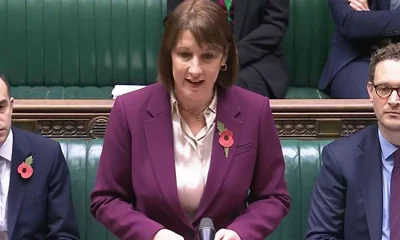News
Park Authority urges people to plan ahead as school holidays begin

PEOPLE are being urged to plan ahead if they are intending to take a trip to the Pembrokeshire Coast National Park’s beaches and attractions this summer.
As well as reminding people of steps they can take to make sure their visit is an enjoyable one, the Authority is highlighting recent changes in specific locations and advising visitors to the Park to check ahead of travelling.
National Park Authority Director of Nature and Tourism, James Parkin, said: “While we prepare to welcome people to this beautiful corner of Wales, we’re providing some advice to ensure everyone makes the most of their time on the Pembrokeshire Coast this summer.
“The few years following the Covid-19 pandemic have placed additional pressure on locations that were already extremely popular in the summer months, so we are encouraging people to plan ahead and make sure they have a plan b in place in case their destination of choice is too busy.
“The Pembrokeshire Coast National Park has plenty of hidden gems that are just waiting to be discovered away from the key ‘hot spots’, from secluded coves to sweeping hills and ‘secret’ waterways and valleys.”
Several changes have been introduced around the county for the 2023 season, including restrictions to parking on Newport Sands / Traeth Mawr beach. Vehicles can no longer park on the beach but people on foot, wheelchair users and those launching small vessels by hand will still be able to access the beach via the two slipways.
The Strumble Shuttle and Puffin Shuttle coastal bus services have been replaced this season by the Fflecsi bus services. Fflecsi tickets must be booked in advance, either via the app, which is available to download via https://www.fflecsi.wales/locations/pembrokeshire/ or by calling 0300 234 0300 during opening hours.
The Authority is also advising people to use lifeguarded beaches and pack picnics as the safest way to snack on the sand, and avoid using barbecues on beaches, which can accidentally lead to grass fires being started.
Dog owners should ensure they respect the restrictions on local beaches and that they keep their pet on a lead on the Coast Path, as well as around livestock to avoid any unnecessary incidents.
The Countryside Code is full of additional advice that will keep everyone safe this summer, including specific guides for activities such as angling and canoeing. The Countryside Code can be found on the Natural Resources Wales website: https://naturalresources.wales/days-out/the-countryside-codes/
For more help in planning your trip to the Pembrokeshire Coast National Park, pick up a copy of Coast to Coast or visit www.pembrokeshirecoast.wales/plan-your-visit
Crime
Coroners inquest opened and adjourned following death of schoolgirl, 12

THE PEMBROKSHIRE coroner has opened an inquest into the tragic death of Honey Foxx French, 12, from Hakin – who died after emergency services were called to a home on Saturday (Oct 19).
Pembrokeshire assistant coroner Gareth Lewis opened an inquest into the 12-year-old’s death on Wednesday (Oct 30).
The coroner adjourned the inquest until April 10, 2025, to allow for further investigation. He extended his condolences to Honey’s family and friends.
Dyfed-Powys Police have stated that her death is not being treated as suspicious.
In a joint statement, Honey’s school, Ysgol Penrhyn Dewi, and Pembrokeshire County Council described her as “much loved and cherished.”
“Honey French was a beloved member of our school community at Ysgol Penrhyn Dewi VA. She was a talented performer and writer who generously shared her humour, time, and talents with our school family and the wider community – she will be deeply missed. Our love, thoughts, and prayers are with her family during this difficult time.”
The police have launched a full investigation, with inquiries ongoing.
News
Taxes up, spending up – It’s Reeves’s gig gamble

THE HEADLINE from today’s Budget is a £40bn increase in taxes.
However, those tax increases are aimed at wealth, investment income, and businesses rather than standard-rate income taxpayers.
For the latter, the minimum wage rose, the price of draught beer was cut, the freeze in income tax thresholds will end, fuel duty will not rise, and the government is forecast to pump £70bn into public services and national infrastructure.
For small businesses, the Chancellor promised to “permanently lower business rate multiplies” for retail and hospitality businesses, cutting the amount of money High Street business pay in rates.
However, the Chancellor giveth and the Chancellor taketh away.
Rachel Reeves said that the employers’ NI rate will increase to 15 per cent from April next year.
In addition, the threshold at which employers start paying NI on each employee’s salary will drop from £9,100 to £5,000.
Those decisions represent a massive tax raid with massive potential impacts on prices (up), wages (lower), and hiring decisions.
Ms Reeves said that the increase in the employers’ NI rate, combined with the lowering of thresholds, would raise £25m for public services.
However, she sugared the pill, also announcing the employment allowance will rise from £5,000 to £10,500.
The Chancellor said: “This means 865,000 employers won’t pay any national insurance at all next year, and over one million will pay the same or less than they did previously.
“This will allow a small business to employ the equivalent of four full-time workers on the national living wage without paying any national insurance on their wages.”
The Chancellor also targeted wealth and inherited wealth.
Inherited pensions, formerly exempt from Inheritance Tax, will be subject to it. The threshold will be frozen (effectively, a rise). The Chancellor reintroduced the cap on lifetime pension pots, which was introduced and then scrapped under the Conservatives.
Farmers leaving estates worth over £1m will be subject to 20% in inheritance tax. Capital Gains Tax on shares and dividend income (unearned income) will rise from 10% to 18% for standard-income taxpayers and to 24% for higher-rate income taxpayers.
For those at the upper edges of income, there was even more bad news. The Chancellor announced the abolition of Non-Dom tax status, which allows the wealthy to duck tax on their income by claiming to be based abroad. That is unlikely to hit many taxpayers, but closing the Non-Dom loophole is an important symbolic act.
Rachel Reeves’s big gamble is that, by frontloading tax increases, there will be no need for substantial future tax rises for the next three years or so. Having boxed herself in on employee NI and income tax, Rachel Reeves left herself limited room for manoeuvre, making tax rises essential if she was to balance the books and fund unaccounted-for expenditures. As examples of the foregoing, Ms Reeves revealed that although the previous government announced compensation schemes for Post Office employees and postmasters and the victims of the contaminated blood scandal, it had not budgeted for funding them and – as Shadow Chief Secretary to the Treasury Laura Trott confirmed afterwards, had no intention of standing by the public sector pay awards it announced at the Budget in March.
The second gamble is that injecting money into capital infrastructure projects will drive forward growth and economic activity. If that happens, it will buck a two-decade-long trend of stagnation and industrial failure. If that works, Labour will reap the benefits; if it doesn’t, and if public services do not improve markedly, Labour will suffer.
Business
Number of Welsh companies with unpaid bills hits 2024 high

THE NUMBER of Welsh companies with overdue invoices on their books reached a 2024 high in September, according to new research from R3, the UK’s insolvency and restructuring trade body.
R3’s analysis of data provided by Creditsafe shows that 18,360 Welsh businesses had unpaid invoices on their books last month – the highest monthly total of the year so far.
The number of Welsh firms with overdue invoices on their books rose by 3.7% in September 2024 when compared to September 2023’s total of 17,709.
Bethan Evans, Interim Chair of R3 in Wales, says: “The rise in businesses failing to pay their bills on time is a clear sign that economic recovery in Wales is still fragile.
“While some sectors may be bouncing back, many firms are still grappling with the ongoing effects of rising costs, wage pressures, and reduced consumer spending, which is making it harder for them to manage their cash flow effectively.”
The number of overdue invoices in Wales also reached a 2024 high in September, with a total 145,687 recorded. This is a slight yearly rise of 0.3% when compared to September 2023’s total of 145,273.
Bethan, who is a partner at Menzies LLP, continues: “Wales’s business debt burden has crept up every month since March and this is creating a growing financial pressure for businesses.
“Without a consistent improvement in payment practices or cash flow, many companies may find it increasingly difficult to manage their debt and maintain operations, and we could see more and more businesses in Wales turning to a formal insolvency solution as a result.
“I would urge business owners and directors that are seeing their debt levels rise to seek advice as soon as they can from a qualified professional. Most R3 members in Wales will be happy to provide a free initial consultation so you can explain the challenges you’re facing, and help you understand the best course of action for you and your business.”
-

 Crime1 day ago
Crime1 day agoPembrokeshire man charged with sexual penetration of seven-week old baby
-

 Crime2 days ago
Crime2 days agoDock man collapses when sentenced for throwing hot meal over his wife
-

 Crime1 day ago
Crime1 day agoDrink-driving Neyland rugby player drove Discovery into two cars
-

 Crime5 days ago
Crime5 days agoIPOC investigating after Haverfordwest woman claims unlawful arrest
-

 Crime4 days ago
Crime4 days agoTeacher sentenced for assault days before pupil’s tragic death
-

 Crime4 days ago
Crime4 days agoMilford Haven man jailed for sexual offending spanning five decades
-

 Crime4 days ago
Crime4 days agoSexual assault at Pembroke Fair prompts police appeal
-

 Crime5 days ago
Crime5 days agoThai woman accused of murdering son, 7, in court

























